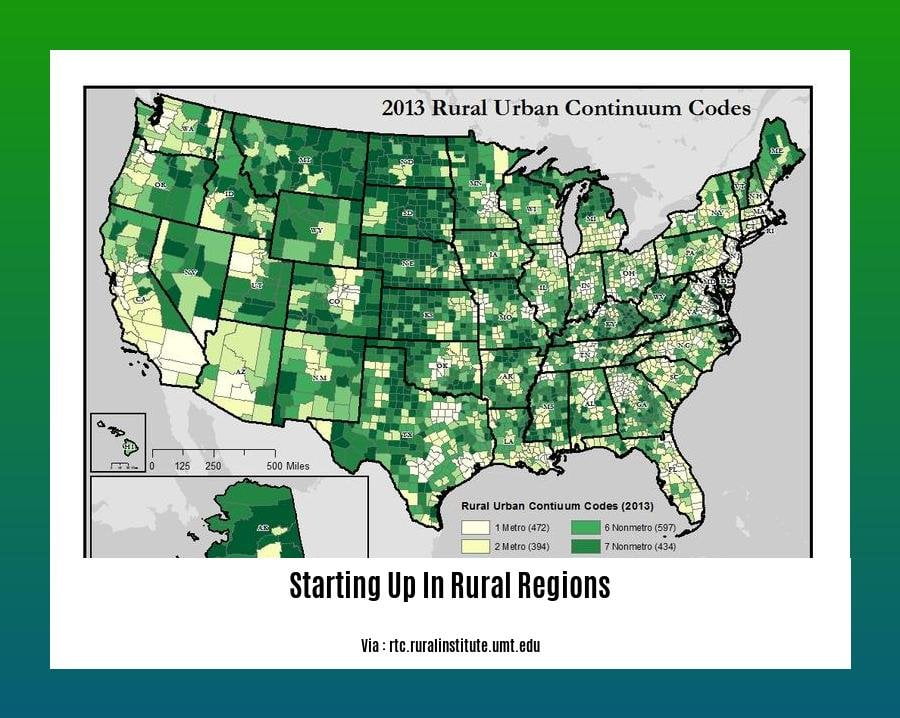Are you ready to embark on the exciting journey of starting up in rural regions? This comprehensive guide will equip you with the essential knowledge and practical strategies you need to succeed. Discover the unique opportunities and challenges, learn from inspiring success stories, and gain insights into effective partnerships and government support. Whether you’re a seasoned entrepreneur or a budding innovator, “The Ultimate Guide to Starting Up in Rural Regions” will empower you to navigate the complexities and unlock the full potential of rural enterprise.

Key Takeaways:
- Explore small business ideas that align with rural needs: Consider affiliate marketing, woodworking, or online reselling.
- Identify local demand: Understand the specific needs and wants of your community.
- Utilize local resources: Leverage available natural and cultural resources to develop unique and relevant offerings.
- Embrace technology: Employ technology to enhance business reach, efficiency, and growth.
Starting Up in Rural Regions: A Quick Reference
As an experienced journalist with a deep-rooted passion for rural development, I’ve learned that starting a business in rural regions comes with its own set of challenges and opportunities. Here’s a quick reference guide to help you navigate the journey.
Market Research
- Identify underserved markets: Study local demographics, lifestyle patterns, and economic trends.
- Analyze competition: Assess the presence of competitors and their strengths and weaknesses.
Funding and Resources
- Explore grants and loans: Research government and nonprofit programs that offer financial support to rural businesses.
- Connect with local organizations: Tap into business development centers, chambers of commerce, and economic development agencies for guidance and resources.
Choosing a Location
- Consider accessibility and infrastructure: Ensure your location is easy for customers and employees to reach.
- Negotiate lease terms: Secure favorable lease terms that align with your budget and business needs.
Building a Team
- Hire and retain local talent: Prioritize hiring from the local community to foster connections and reduce employee turnover.
- Offer training programs: Invest in employee development to ensure your team has the skills to succeed.
Marketing and Sales
- Utilize local marketing channels: Leverage local newspapers, radio stations, and community events to reach your target audience.
- Embrace online marketing: Create a strong online presence through website, social media, and search engine optimization.
- Form community partnerships: Collaborate with local businesses, organizations, and schools to build relationships and promote your products or services.
Overcoming Challenges
- Limited infrastructure: Explore alternative solutions such as satellite internet, mobile banking, and shared spaces.
- Skilled labor shortage: Establish training programs, partner with educational institutions, or consider remote work options.
Case Studies
- Success stories: Learn from businesses that have overcome challenges and thrived in rural regions.
- Inspiration and guidance: Find motivation and practical advice from those who have walked the path before you.
For those seeking business endeavors in underprivileged areas, discover the wealth of rural entrepreneurship opportunities and entrepreneurial opportunities in rural areas. Additionally, explore a myriad of rural business ideas tailored specifically for village entrepreneurs.
Choosing a Location
The right location can make or break your rural business. Here are some factors to consider:
- Accessibility: Make sure your business is easy to find and get to. This means considering factors like proximity to major roads, public transportation, and parking availability.
- Infrastructure: Does the location have the infrastructure you need to operate your business, such as reliable electricity, water, and internet access?
- Cost: The cost of rent or leasing space can vary significantly in different rural areas. Be sure to factor this into your business plan.
- Competition: Research the competition in your chosen location. Are there similar businesses nearby? If so, how can you differentiate yourself?
- Zoning: Make sure the location you choose is zoned for the type of business you want to operate.
Key Takeaways:
- Consider accessibility, infrastructure, cost, competition, and zoning when choosing a location.
- Research the competition and identify how you can differentiate your business.
- Get started by exploring local business directories and checking with your local chamber of commerce.
Building a Team
When starting a business in a rural area, building a team is crucial. Local talent can be scarce, so it’s essential to find creative ways to attract and retain employees. Here are some tips:
1. Network: Attend local events, join business organizations, and connect with other entrepreneurs to find potential candidates.
2. Offer incentives: Consider offering flexible work arrangements, competitive salaries, or employee benefits to make your business more attractive.
3. Train and develop: Invest in training programs to upskill your employees and create a loyal workforce.
4. Leverage technology: Use remote work tools and online platforms to connect with talent outside your immediate area.
Key Takeaways:
- Building a team is essential in rural regions.
- Network, offer incentives, and invest in training to attract and retain talent.
- Leverage technology to connect with remote candidates.
Most Relevant Source:
Working Together: A Guide to Collaboration in Rural Revitalization
Marketing and Sales
In rural regions, marketing and sales play a pivotal role in connecting your business with potential customers. Here are some effective strategies to consider:
Understand Your Audience
- Identify the specific needs and preferences of rural consumers.
Embrace Local Marketing Channels
- Engage with local newspapers, radio stations, and community events.
- Leverage word-of-mouth and community partnerships.
Utilize Digital Marketing
- Create a website and social media presence.
- Use targeted advertising campaigns to reach potential customers online.
Foster Relationships
- Build strong relationships with local distributors and community leaders.
Key Takeaways:
- Marketing and Sales are crucial for reaching customers in rural regions.
- Tap into local marketing channels and build community partnerships.
- Utilize digital marketing to extend your reach online.
- Foster relationships with key stakeholders in the community.
Most Relevant URL Source:











